Leaving the pandemic behind: Kidney March participants to gather for 13th annual fundraiser
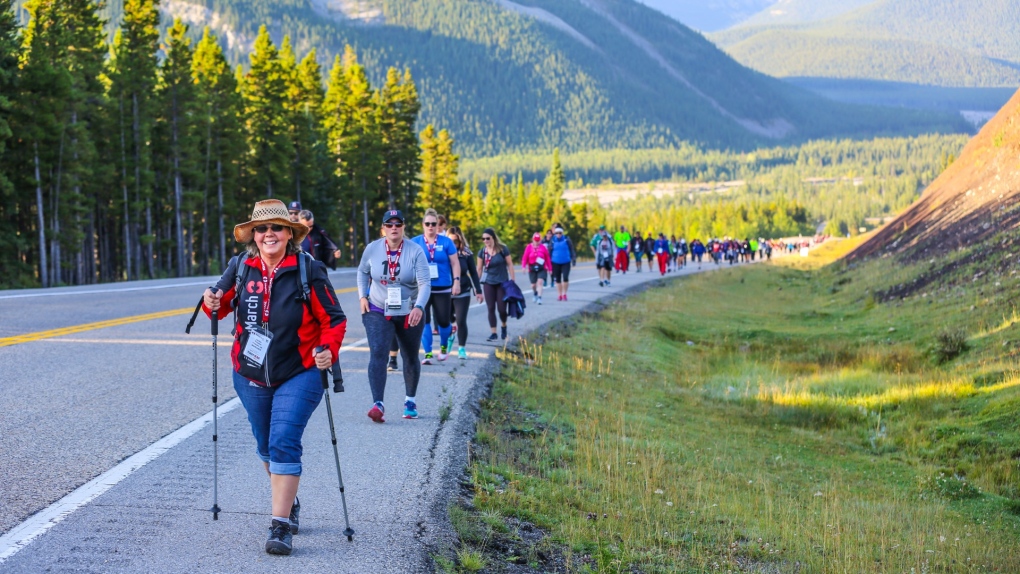 Some 400 participants are expected to take part in this year's Kidney March.
Some 400 participants are expected to take part in this year's Kidney March.
Come Sept. 9, hundreds of people will gather in Kananaskis, with the intention of walking for three days straight before they end up back in Calgary.
They'll put themselves through this to direct dollars and awareness toward the ongoing battle against kidney disease.
The Kidney March, the Kidney Foundation of Canada's signature event, is back in full form for its 13th annual outing after a couple of years of doing things a little bit differently in the face of the COVID-19 pandemic.
Started in 2010, the 100-kilometre endeavour is usually done en masse.
For 2020 and 2021, the event was done "virtually," meaning those taking part did their walking alone or with their safe people, wherever they happened to be.
Some of the 400 or so people expected to participate in 2022 have never done so with the larger group.
While many are itching to get back to the way it was, all taking part know how much is at stake.
According to the foundation, kidney disease is a leading cause of death in Canada and a silent killer – by the time you know you've got it, it is often too late.
Kidney disease can't be cured, nor can kidney damage be reversed, the foundation says.
"There are so many people in Canada with kidney disease – more than one in 10 Canadians have kidney disease, or is at great risk for kidney disease, and most of them don't even know it, said Joyce Van Deurzen, executive director for the Kidney Foundation of Canada, Southern Alberta and Saskatchewan branches.
CTV Calgary spoke with several people taking part in this year's Kidney March:
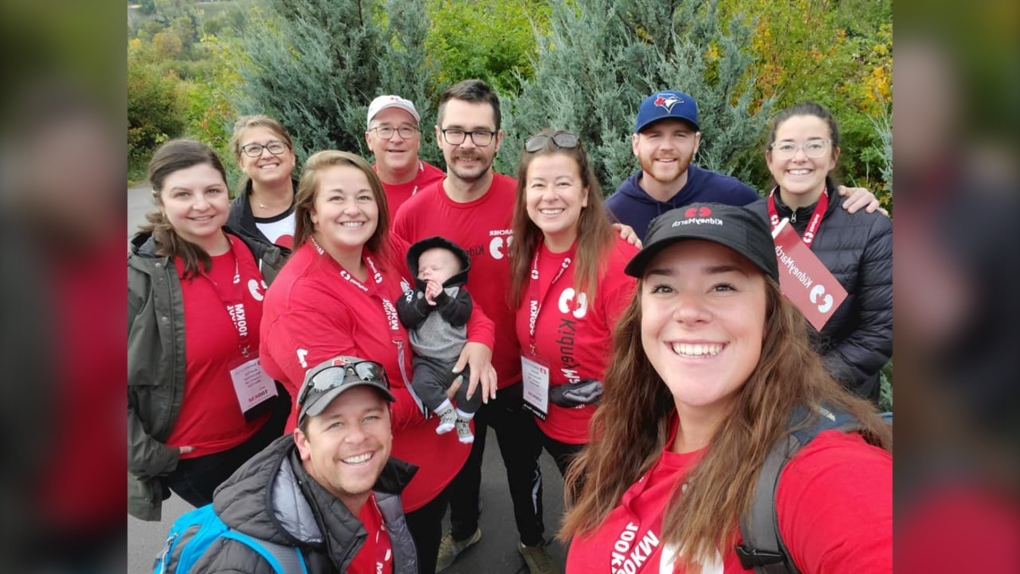
Siarra Weisensel
"(Organ donation) changes people's lives. It saves them. If my mom hadn't gotten a kidney, she probably wouldn't be here anymore."
Sitting in a hospital room with a greater understanding that no one in this life is guaranteed anything, Siarra Weisensel and members of her family made a vow.
They'd heard about Kidney March from friends of friends who'd taken part before, and Siarra says that day she and her loved ones asked themselves, "Why aren't we doing this?"
"We decided pretty much in the hospital room ... we were going to put in a family team," Siarra said.
They were in the hospital for Siarra's mom, Lorelei.
Siarra says Lorelei was diagnosed with polycystic kidney disease long ago, and her family watched as her kidneys "just got worse and worse."
Eventually, Lorelei's kidneys failed altogether, which could've been the end, but serendipity struck instead.
"We all started to reach out to people to see if we could find her a kidney donor and weirdly, the week after we posted on social media she got a call from the hospital," Siarra said.
"There was a donation for her."
Siarra says it is not lost on her family how fortunate they are to still have Lorelei in their lives almost three years after that day in the hospital, when Lorelei received her kidney.
"Mom was really lucky she found a donor. A lot of people aren't that lucky, so it's important to focus energy on being able to help people find what they need to live their best life," Siarra said.
That year and the year after, Siarra's family followed through on their promise to take part in the Kidney March.
This year, they'll do it again as part of a much larger group for the first time.
"We're looking forward to meeting all of the other teams of people who've been doing this for a long time," Siarra said.
"Just getting to be a part of that vibe that we kind of missed out on a little bit, just because we haven't been at the camp with the hundreds and hundreds of people who are all going to be marching together."
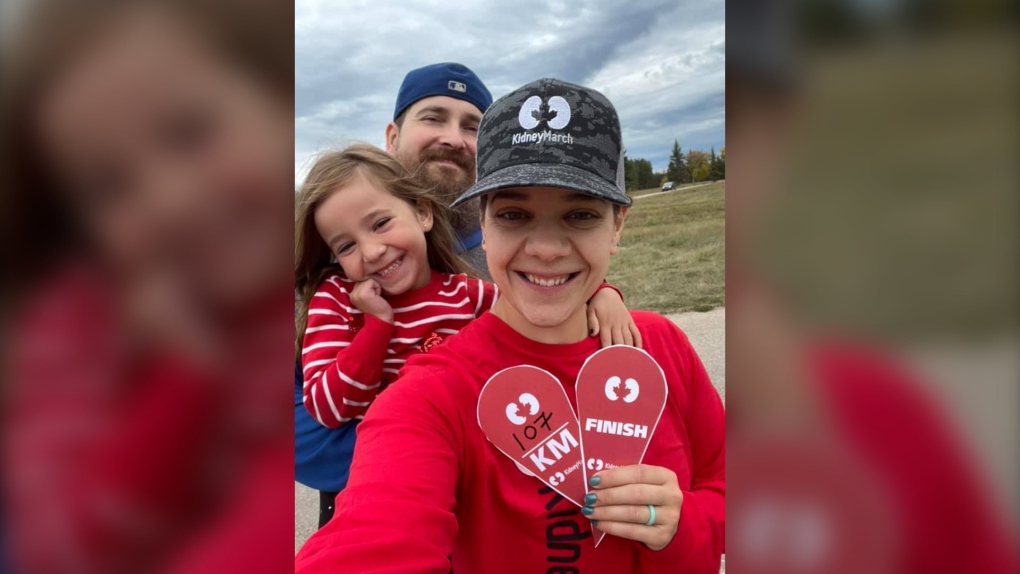
Grace Jodoin
"I've always been a giver."
Grace Jodoin was poking around Facebook one day when the story of a young man she'd never met popped up.
And then, it was there again. And again.
He had a wife, pregnant with their first child, and if he didn't find a kidney donor, he might not be around to be there for them.
"Being a mom, I couldn't imagine not being able to do all those things with my kids because I was on dialysis all the time or whatever," Grace said.
"I was like, if I can give this man a chance to be a dad, let's do it, because being a parent is the best thing in the world."
Just over a year later, both Grace and the young man were in a hospital, she about to have a kidney removed and he about to receive it.
This sort of thing is normally done anonymously, and the recipient had no idea who Grace was, but she was familiar with him from Facebook.
So when she passed him on her way into the hospital, she knew it.
And when his wife and newborn baby stepped onto an elevator as she was getting off, she knew it.
She finally smiled and gave a wave as they were wheeled by each other on the way into surgery.
Once in recovery, she reached out on Facebook.
"His first response when I asked to meet him was, 'I will never forget the smile and the wave that you gave me going into the surgery,'" Grace said.
"He said, 'It is in that moment that it hit me that you were the one who was giving me a kidney.'"
That was a few years ago now, and Grace says the lifelong friend she made that day is doing well.
And every year since, she's continued to be a giver by taking part in the Kidney March.
"I believe that if it were me or my kids or somebody in my family in the same position, (I would want someone) out there, helping and raising money and doing all of the things that they can't do," Grace said.
This will be Grace's first year taking part in the event the way it was originally envisioned, and she says she's "really excited to get the whole experience of it."
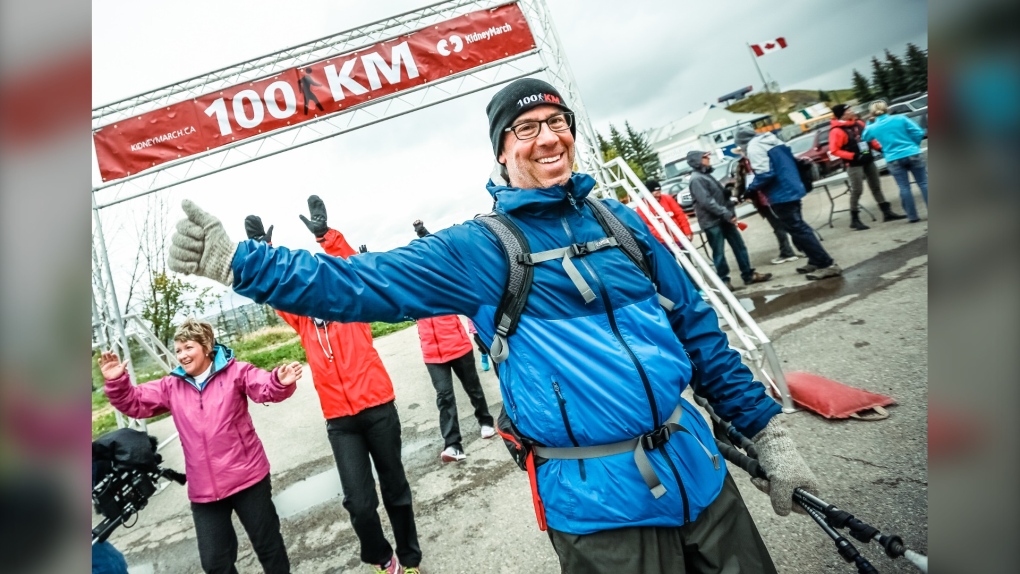
Dr. Daniel Muruve
"When you're walking for hours on end you think a lot about stuff. ... putting in those hours gives you a lot of time to reflect."
Other than the federal government, the Kidney Foundation of Canada is the only entity in the country pumping money into kidney research, according to kidney specialist Dr. Daniel Muruve.
Money drives innovation, Dr. Muruve says, and so the continued success of the Kidney March is crucial.
"A lot of what we do with the Kidney Foundation is fund research to try to find treatments for kidney disease to preserve people's kidneys so that they don't fail," Dr. Muruve said.
"In our field, we need to do more research to find those treatments.
"Historically, the way people view treatment is often at the other end – after the kidneys have failed. They talk about dialysis and transplantation, but that's not the way we should be treating people with kidney disease."
That belief has pushed Dr. Muruve to do what he says is one of the most gruelling things he's ever put himself through every year for the past seven.
He continued taking part throughout the pandemic, like so many others.
And he's looking forward to gathering with everyone again and sharing in the experience.
"You suffer for three days. ... I like to draw the parallel of what we do for three days is what patients on dialysis or patients with chronic kidney disease have to do for years," Dr. Muruve said.
"It's not easy.
"It symbolizes what chronic disease is about – it's hard and there's no break."
The doctor says he finds walking for three days straight gives him a lot of time to get lost in his own head.
"You think about life and you think about all the struggles that people go through, that you go through. You realize that we're all on this planet together and we all have our challenges," he said.
"It brings you back down to earth.
"You realize that we're all equal here and we all have to work together to have a better outcome in the future."
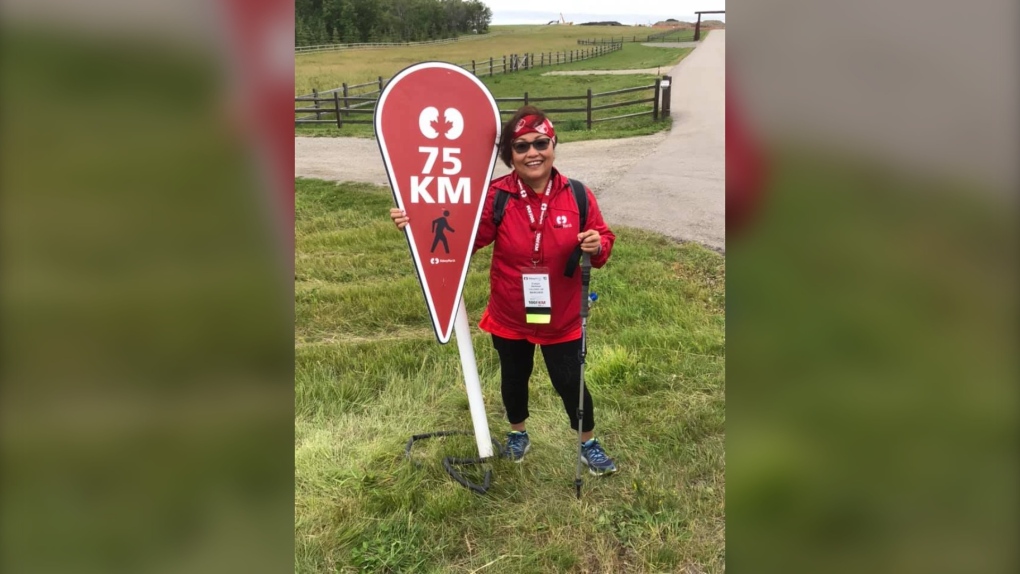
Evelyn Serbout
"When you join Kidney March, it's not only for the moment."
After Evelyn Serbout lost her sister, Zenny, she thought her reason for doing the Kidney March was gone and that she had failed in the goal she'd worked toward for more than a year.
"I really had a high hope that I was going to find a donor for her," Evelyn said.
Evelyn signed up for Kidney March for the first time because not long after their mother had passed away from kidney failure, Zenny seemed headed toward the same fate.
Zenny's kidneys were deteriorating, and though there were nine kids in the family, not one was a match for organ donation.
Dialysis was the only option, and everyone in the family was left wondering what they could do.
Evelyn found her answer in the form of a radio ad for the Kidney March.
Evelyn wasn't sure she could do it, and Zenny wasn't sure Evelyn should.
But Evelyn told her, "If I can find a donor for you through Kidney March, I can walk mountains."
It became a thing she and her sister would be inspired by and bond over - Evelyn spent some of her time training for Kidney March in Winnipeg, where her sister was.
Zenny was slowly moving up the donation list, many dollars were being donated and things were looking hopeful as Evelyn's next event neared.
And then the pandemic hit.
It ultimately wasn't kidney failure that Zenny passed away from, but losing her sister had left Evelyn questioning marching on all the same.
"My family told me, 'You shouldn't stop doing it, because now your reason is way bigger – every step you're going to take, you're going to dedicate to her,'" Evelyn said.
"That year, my husband joined Kidney March, my brother here in Calgary joined Kidney March, and my daughter. ... This year, they all joined again and my sister-in-law this time joined and a lot of my friends also joined.
"Now, they all understood how important Kidney March is, not only to me but to everybody that we touch, whether it's family, friends or not."
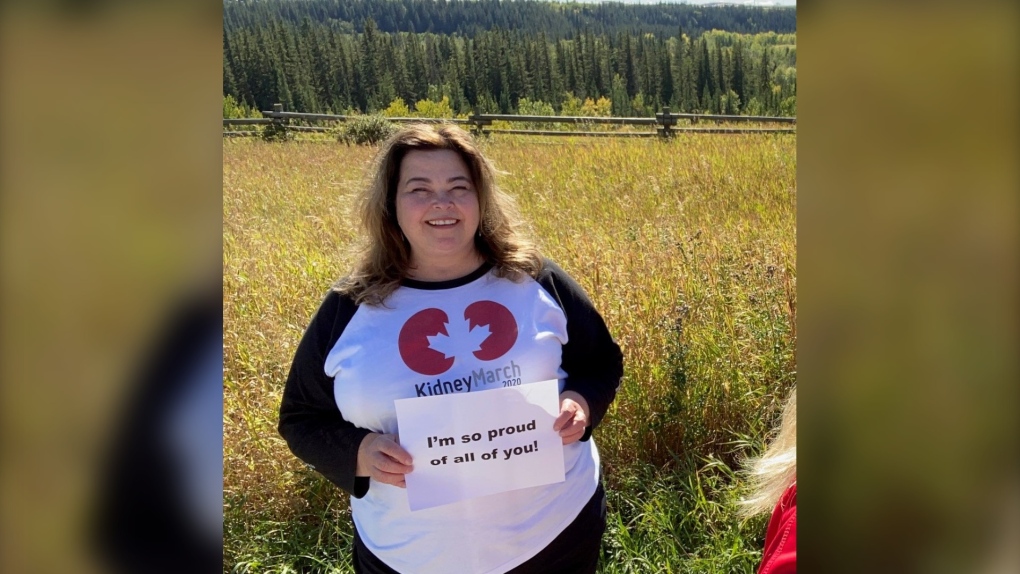
Joyce Van Deurzen
"We asked people to walk the farthest they've ever walked and raise the most money they've ever raised."
Getting the Kidney March back to the way it was before the world went weird will be a special moment for Joyce Van Deurzen, executive director for the Kidney Foundation of Canada, Southern Alberta and Saskatchewan branches.
She's one of the event's founders, and it's been a much different affair the past couple of years than it was the decade prior.
"To be able to do this again, face to face, I think that's going to be really emotional and very, very meaningful," Joyce said.
It's not that the Kidney March was a bust during COVID-19 – the first year of the pandemic and first "virtual" event saw the second-highest amount of donations ever.
Joyce says people stayed on board for the cause.
"They walked where they were, they sent us pictures, video clips and everything and it was really remarkable – it really felt like a community coming together even though they weren't physically together," Joyce said.
But if you're going to ask people to "do the most they could possibly do," Joyce says, you want them to meet each other and push themselves alongside each other.
You want to do it together.
"This is a pilgrimage to make a difference in a big, big way," Joyce said.
"We've learned how to do a very good virtual event ... (but) we've got lots of new participants joining us this year and we're excited to meet them.
"Kidney March is all about people coming together to make a difference in the lives of others and to create a different future."
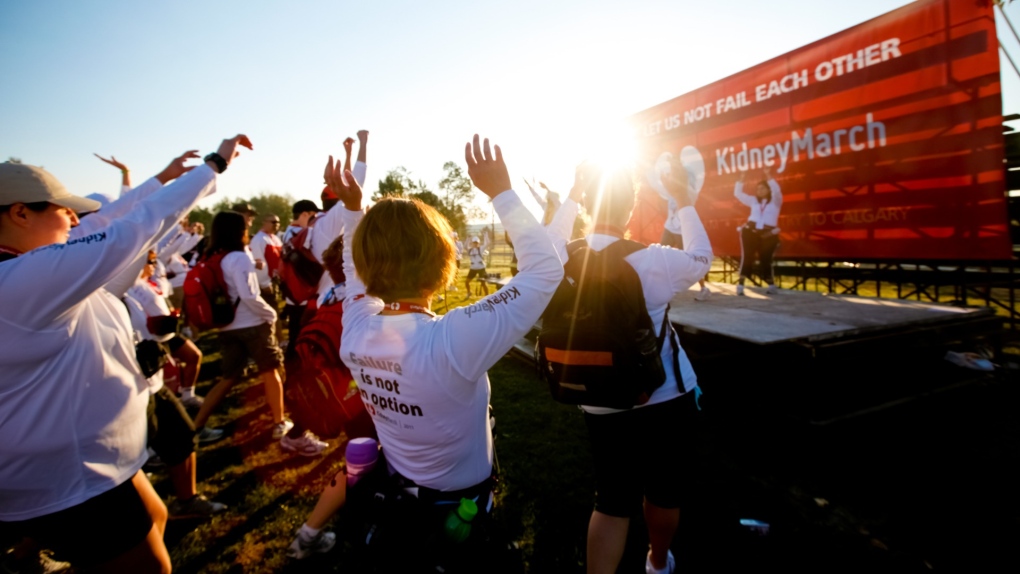
This year's Kidney March runs Sept. 9-11, starting in Millarville with an opening ceremony and ending in Calgary with a closing ceremony at Canada Olympic Park.
In between, those taking part will spend two nights at camp outside Bragg Creek, trekking 33 kilometres each day.
Each one of them has raised a minimum of $2,200 to put toward the cause.
Over the past 13 years, the Kidney March has raised more than $11.5 million in support of the Kidney Foundation of Canada and its work toward improving kidney research and the outcomes of those who are ill.
More information can be found at kidneymarch.ca.
CTVNews.ca Top Stories

LIVE UPDATES Latest info: FBI says the New Orleans truck attacker acted alone in an 'act of terrorism'
The FBI now says the New Orleans truck attacker acted alone in an 'act of terrorism' when he drove a pickup truck into a crowd of New Year's revellers early Wednesday, killing 15 people.
Possible scenarios that could play out in Ottawa as the Liberal government teeters
Prime Minister Justin Trudeau is said to be reflecting on his future over the holidays after the resignation of his top cabinet minister, Chrystia Freeland, in mid-December. The bombshell move prompted a fresh wave of calls for Trudeau to step down as Liberal leader from inside and outside the caucus.
Woman, father killed on New Year's Eve were victims of intimate partner violence: Halifax police
Halifax police are investigating three deaths that are connected – two of which they say were homicides resulting from intimate partner violence – in the city on New Year’s Eve.
Man who died in Tesla Cybertruck explosion was active-duty U.S. army soldier, officials say
The person who authorities believe died in the explosion of a Tesla Cybertruck packed with firework mortars and camp fuel canisters outside U.S. president-elect Donald Trump's Las Vegas hotel was an active-duty U.S. Army soldier, three U.S. officials told The Associated Press on Thursday.
FORECAST Weather warnings issued in 6 provinces and territories
Wintry weather conditions, including heavy snow and wind chill values around -55, prompted warnings in six provinces and territories early Thursday morning.
5 things we know and still don't know about COVID, 5 years after it appeared
The virus is still with us, though humanity has built up immunity through vaccinations and infections. It's less deadly than it was in the pandemic's early days and it no longer tops the list of leading causes of death. But the virus is evolving, meaning scientists must track it closely.
Who are Canada's top-earning CEOs and how much do they make?
Canada's 100 highest-paid CEOs earned $13.2 million on average in 2023 from salaries, bonuses and other compensation, according to the Canadian Centre for Policy Alternatives.
More Popsicles, please: Your tonsils can grow back
Tonsil regrowth is rare. Here's one woman's experience when she had to get her tonsils removed – again.
How to watch the Quadrantids, one of the strongest meteor showers of the year
The new year kicks off with the peak of the Quadrantids, one of the strongest meteor showers of the year, according to NASA.

































